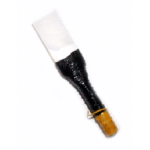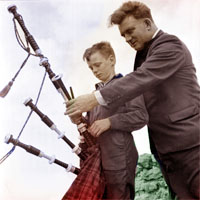
The Great Highland Bagpipes are a powerful and evocative instrument. Although there are only nine notes, the amount of music written for it is staggering. If you are interested in learning to play the bagpipes, the first thing you need to know is that you don't need a set of bagpipes. Do not rush out and buy a set of bagpipes. We will begin discussing your instrument purchase 6-8 months into your lessons. There are a lot of bad bagpipes on the market and I've seen a lot of people buy useless instruments. So what do you need?
To begin learning to play the Great Highland Bagpipes you will need:
- A practice chanter and several reeds
- If you have large hands, you should ask for a "long" practice chanter. By "large", I mean anything that isn't small. So unless you have small hands, get the "long" practice chanter.
- If you already play a wind instrument, you may want to ask for an Abbot reed with you beginner kit. They're a little more tolerant for people who already have well-developed breathing skills (i.e. trombonists, clarinetists, trumpeters, etc.).
- A lesson book. We will use The Highland Bagpipe Tutor Book One formerly known as The College of Piping Highland Bagpipe Tutor Part 1 which is affectionately known as The Green Book. The Green Book comes with a CD with audio examples and worksheets. Please print the worksheets, place them in a 3-ring binder and bring them to all lessons.
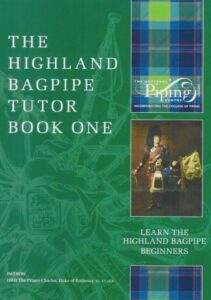 |
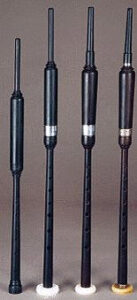 |
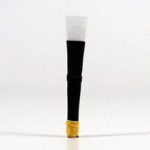
|
Later, we will also use The College of Piping Essential Tunes for the Piper (Volumes 1 and 2) for supplementary material.
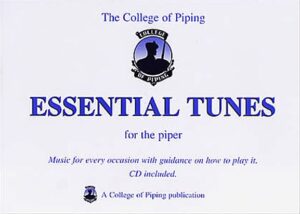 |
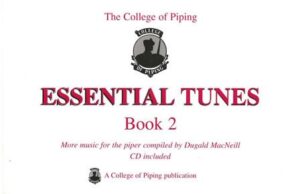 |
Take the First Step…
If you are ready to schedule your lesson, please contact Dr. Berlin. There is a VERY limited amount of openings each new term, so don’t delay.
To the make of a piper (excerpt)
by Neil Munro
To the make of a piper go seven years of his own learning,
and seven generations before.
At the end of his seven years
one born to it will stand at the start of knowledge,
and leaning a fond ear to the drone
he may have parley with old folks of old affairs.
The music of the Highland bagpipe is usually said to be divided into three categories: Ceol Mor, the "big music" or Piobaireachd; Ceol Beag, the "little music," that is quicksteps and dance music, and Ceol Meadhonach, the "middle music" which lies between the other two and consists of such tunes as are neither constructed in the measure of Piobaireachd, nor adapted for the quick march or dance.
Tutor Book 1 (Green Book) Ceol Beag repertoire includes...
Scots Wha Ha'e, Brown Haired Maiden, High Road to Gairloch, Highland Laddie, Mist Covered Mountains, 79th's Farewell to Gibraltar, The Earl of Mansfield, The Inverness Rant, The Piper of Drummond, Green Hills of Tyrol, The Atholl Highlanders
Tutor Book 2 (Red Book)
Tutor 2, known as the Red Book, is a manual for moving on to the pipes after students master the material in Tutor 1.
Tutor Book 3 (Blue Book) Ceol Beag repertoire includes...
My Home, The Flowers of the Forest, The Thistle of Scotland, Killiecrankie, The Crusaders' March*, Bonnie Dundee, Scotland the Brave, Sean Truibhais, Gille Challum, Skye Boat Song*, Devil in the Kitchen, A Man's a Man for A' That*, Jock Wilson's Ball, The Barn Dance, Mrs. MacDonald of Dunacht, Dorrator Bridge, Lexie MacAskill, Pipe Major Willie Gray's Farewell to Glasgow Police, Johnnie Cope*, Lady Louden, The Rejected Suitor, The Mason's Apron, The Jolly Beggarman, Paddy's Leather Breeches, The Jig of Slurs
*Some older editions have these tunes. 1992 Revision Sequence: The Thistle of Scotland, The Flowers of the Forest, Mrs. MacDonald of Dunacht, My Home, Sean Truibhais, Dorrator Bridge, Gille Challum, Skye Boat Song, Jock Wilson's Ball, Killiecrankie, The Crusaders' March, Willie Gray's Farewell to Glasgow Police, Johnnie Cope, Scotland the Brave, Lady Louden, Devil in the Kitchen, A Man's a Man for A' That, The Rejected Suitor
Piobaireachd Tutor (Ceol Mor) (Yellow Book) repertoire includes...
The Company's Lament, Mackintosh's Banner, Lament for Alasdair Dearg, Glengarry's Lament, Nether Lorn (Canntaireachd)
Essential Tunes Book 1 Ceol Beag repertoire includes...
79th's Farewell to Gibraltar, A Man's a Man for A' That, Amazing Grace, Auld Lang Syne, Barren Rocks of Aden, The Battle of the Somme, Bonnie Dundee, Brown Haired Maiden, Bugle Horn, The De'il Amang the Tailors, Devil in the Kitchen, Earl of Mansfield, Flowers of the Forest (Lament), The Gay Gordons, Ghillie Callum (Sword Dance), Glendaruel Highlanders, The Green Hills of Tyrol, Happy We've Been A' Thegither, Heights of Dargai, High Road to Gairloch, The High Road to Linton, Highland Cradle Song, Highland Laddie, The Inverness Rant, The Kilt is My Delight, Liberton Pipe Band, Lochaber No More (Lament), Lochanside, Lord Dunmore (The Bride's Jig), Loudon's Bonnie Woods and Braes, Mairi's Wedding, The Marquis of Huntly's Highland Fling, The Mist Covered Mountains, Mrs. MacLeod of Raasay, My Home, My Love She's But a Lassie Yet, The Old Rustic Bridge, Orange and Blue, Piobaireachd of Donald Dubh, The Piper of Drummond, The Rowan Tree, Scotland the Brave, Scots Wha Ha'e (Bruce's Address), Sleep Dearie Sleep, Steam Boat, Teribus, When the Battle's O'er, Whistle O'er the Lave O't (Sean Truibhais)
Essential Tunes Book 2 Ceol Beag repertoire includes...
The 25th (KOSB's) Farewell to Meerut, The 72nd's Farewell to Aberdeen, The Ale is Dear, The Atholl and Breadalbane Gathering, Atholl Highlanders, The Battle of Waterloo, Because he was a Bonny Lad, The Bens of Jura, Black Bear Hornpipe, Bonnie Hoose o' Airlie, The Borderers, The Braes o' Mar, The Cameron Men, The Cock o' the North, Campbell's Farewell to Redcastle, Colin's Cattle, Colonel Robertson of Toronto, Corn Rigs, Corriechoillie's 43rd Welcome..., Cutty's Wedding, Dovecote Park, Cork Hill, The Drunken Piper, Far o'er Struy, The Flower of Scotland, The Garb of Old Gaul, General Stewart of Garth, Granny Duncan, Greenwood Side, The Heroes of Vittoria, Hot Punch, I'm No' Awa' Tae Bide Awa', Jennie's Black E'e, Jenny's Bawbee, Joe McGann's Fiddle, Johnny Cope, Kenmure's On and Awa' Willie, King George V's Army, Leaving Lismore, Lord Byron, Lord Lovat's Lament, MacDonald's..., MacKay's Farewell to the 74th, Mairi Ban Og, The Mason's Apron, McPhedran's Strathspey, The Midlothian Pipe Band, Miss Ada Crawford, Monymusk, My Lodging's on the Cold Ground, The Saffron Kilt, Sandy Duff, Sir Colin Campbell's Farewell to Crimea, Stirling Castle, The Wandering Piper, The Wind that Shakes the Barley
Kilberry Book of Ceol Meadhonach repertoire includes...
The Badge of Scotland, Ben Doran, The Boatman, The Braes of Rannoch, The Brown-Haired Lad, The Brown-Haired Lassie, The Carles with The Breeks, The Carles with The Footless Stockings, The Death of The Chief, The Flowers of The Forest, The Forty and Twa, The Green Hills of Tyrol, The Hawk That Swoops on High, Hearken My Love, The Highland Emigrant, Ho Fill Your Glass, I Love the Highlands, I Return No More, The Isle of Mull, Lament For Rory Mor, The Land of the Trees, Loch Duich, Lochaber No More, The Maid of Islay, The Mist Covered Mountains, Mull of the Mountains, My Bonny Brown Haired Maiden, My Faithful Brown-Haired Lass, My Faithful Fair One, My Home, Nameless, Not the Swan on The Lake, Ossian's Lament for His Father, The Slow Atholl March, The Sword of The Chief Of Islay, The Torchless Lass, The True Lover's Lament, We Will Return Home to Kintail, When the Battle Is Over, Yesterday I Was on Ben Doran
In Memory of My Teacher
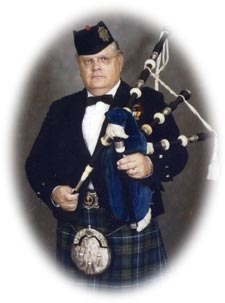
William T. "Robbie" Robertson
Pipe Major William T. Robertson III was born and raised in Indianapolis, Indiana. He taught for twenty-seven years in the Houston Independent School District. On May 8, 2007, Robbie passed away.
Robbie started his piping career in 1954 under the tutelage of his father. His first band experience was a D.A.V. sponsored Boy Scout band in Indianapolis. He played in this band until the Spring of 1957, when he "put away" the pipes for six years. In the Spring of 1963, he once again took up the pipes, under the tutelage of Don Maitland and started playing with the Gordon Pipers of Indianapolis, and later was one of the founding members of the Indiana Scottish Pipe band of Indianapolis, playing with both bands until his entry into the U.S. Air Force in 1966.
While stationed at Chanute AFB, Illinois, he played with the Peoria Pipe Band of Peoria, Illinois, under Pipe Major Phil Eskew. His Air Force assignment took him to Vietnam in October of 1966 where he was attached to the 1st Air Cavalry Division at An Khe. The pipes soon followed and, by Christmas of 1966, "Robbie" was keeping alive the tradition of pipers in Combat. Upon his return stateside, he was assigned to Kelley AFB, in San Antonio, Texas, and was asked by locals to help in the formation of a pipe band there. The result became the Alamo City Highlanders, and its 3 "children" -- the San Antonio Pipes & Drums, the Black Bexar Pipe Band, and the Alzafar Shrine Highlanders.
Upon his discharge from the Air Force and subsequent marriage, he moved to Tampa, Florida, and played with the Bay Area Pipes and Drums and the Egypt Temple Shrine Highlanders. Returning to Texas in 1971, he played with the Houston Highlanders for a year before returning to San Antonio and the Alamo City Highlanders.In 1979 due to job changes, he returned to Houston and the Highlanders. In 1983 he was asked to assist in forming a pipe band for the Arabia Shrine Temple and continued as Pipe Major until the dissolution of that band in 1995.
Over the years, he has served as Pipe Sergeant of the Houston Highlanders, as the official piper for The University of Houston Downtown Criminal Justice Training Center, instructor for the Houston Fire Department Pipes and Drums, instructor for The Galveston County Fire Fighters Pipes and Drums, Pipe Major of the Alamo City Highlanders, The San Antonio Scottish Pipe Band, the Arabia Temple Pipes and Drums, and Pipe Sergeant of the Indiana Scottish Pipe Band.
